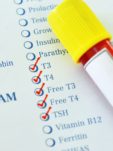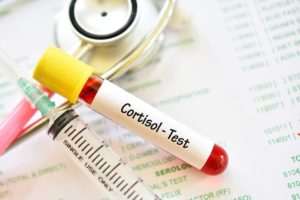Hormone Testing Basics – Part 2 – Adrenal and Thyroid Hormones
Hormone testing basics – Part 2 – Adrenal and Thyroid Hormones
If you have not read Part 1 of this miniseries on hormone testing be sure to check back here and read this as well!
Thyroid Testing
Most commonly I will run a thyroid panel via blood which measures:
- TSH
- Free T4
- Free T3
- Anti-Thyroid peroxidase antibodies
- Reverse T3 (this is an add-on to the standard panel and is not always required)
- Anti-thyroglobulin antibodies

On occasion I will also add in these tests:
TSH is secreted by the pituitary and is a messenger hormone. It is the hormone that tells the thyroid to get going or in its absence, slow down. When the thyroid becomes less responsive, or we have less free thyroid hormone (free T4 and free T3) floating around in our system, this hormone will rise to stimulate the thyroid. Unfortunately, this feedback system is imperfect, and conventional medical doctors in BC will only act (or measure anything other than TSH) when TSH is over 5 or under 0.1. This is because they wait until the thyroid function is at the extremes and requires drug therapy. As a Naturopathic Doctor, I want to catch the declines (or increases) in thyroid function much earlier so that we can remove barriers to its function and avoid lifelong drug intervention. For this reason, I prefer to do a very thorough investigation into the thyroid with those tests listed above if thyroid dysfunction is suspected. For more information on the Thyroid gland read this. (Link to Thyroid Gland Dysfunction blog post)
Adrenal function and Cortisol Testing
The adrenal glands work together with the hypothalamus and pituitary gland to govern our stress response. In our busy daily lives this can commonly become dysregulated causing imbalanced secretion of adrenaline, noradrenaline and cortisol. This can typically be spotted by an ND during your office consultation, but if testing is needed, we most commonly do so via dried urine (DUTCH test). If the cortisol secretion is suspected to be at the extremes of high or low, then morning cortisol can be measured in the blood.

Many more test possibilities
These are a few of the main hormone tests that I use, but there are many others that may be needed depending on the case.
Costs
Costs of the tests will vary. The blood tests can range from $10-50 per hormone so total costs will depend on the number of tests run. The dried urine (DUTCH) test investment is from $450 and up. Cost considerations are always discussed with our patients. With our patient-centred model of shared informed decision making, you will always be given a thorough explanation on what I think needs to be run and why, as well as the cost.
Let me guide you through this
You do not have to figure out what tests you need before you come in. That is my job, and I love it! This primer is meant to give you a basic understanding of hormones and what we can do to ensure your hormones are working at their best. This is not meant to replace a comprehensive naturopathic visit. Helping with hormone biochemistry is one of my favourite things! So, let us dive in and figure this out together.


